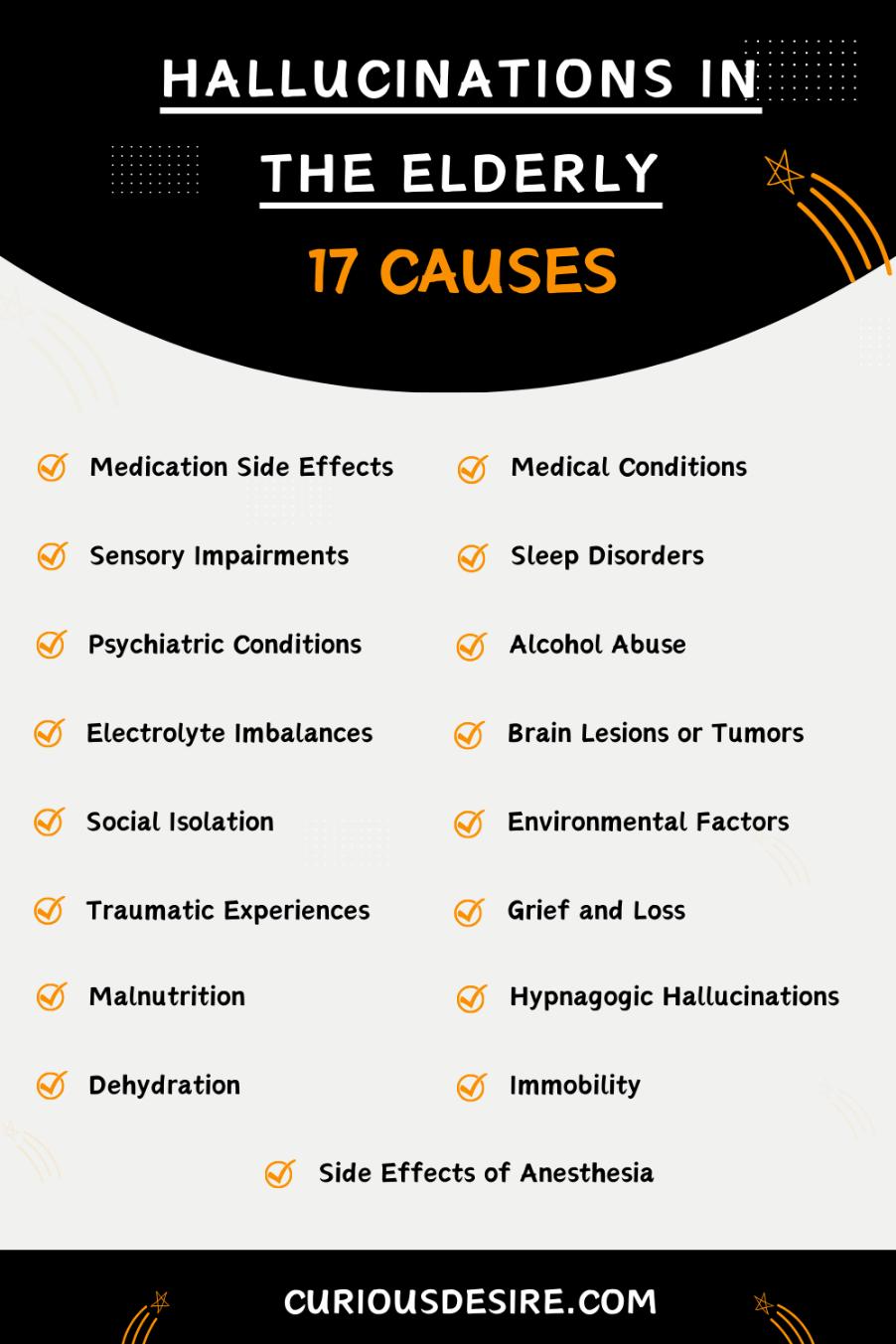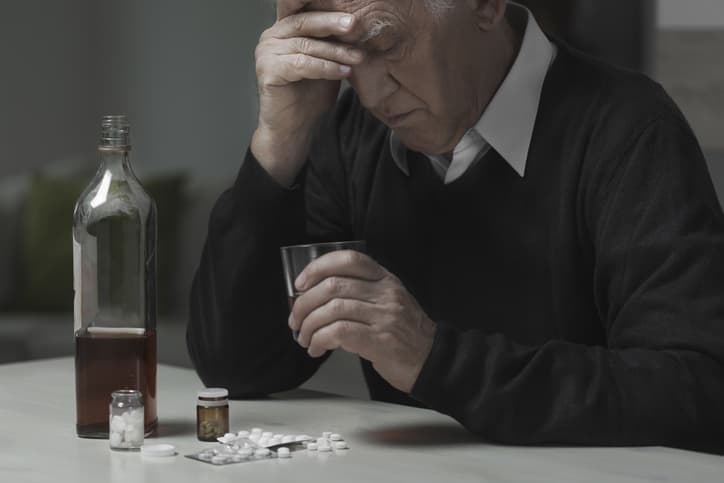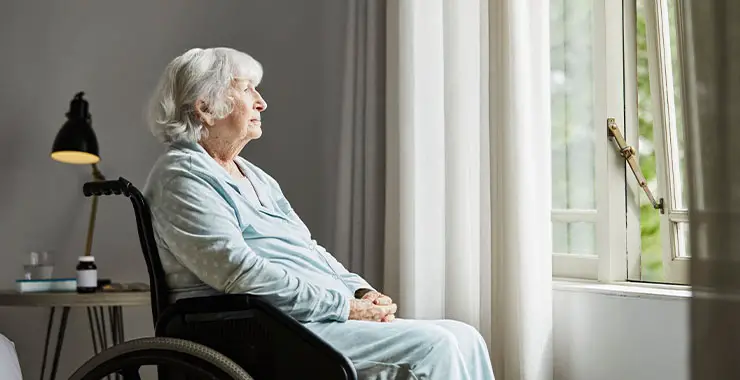Hallucinations, which involve perceiving things that aren’t present, can be a complex and challenging experience, especially for the elderly.
Understanding why older people might have hallucinations is crucial for providing them with the right care and help.
In this article, we’ll explore the different reasons why older people might start experiencing hallucinations to help you provide better care to the elderly.
Let’s get started!
Here are the top 5 causes of hallucinations in the elderly:
- Medical Conditions
- Sensory Impairments
- Psychiatric Conditions
- Electrolyte Imbalances
- Social Isolation
[toc]

Cause 1: Medication Side Effects
One of the primary causes of hallucinations in the elderly is certain medications, particularly those affecting the central nervous system, which may lead to unintended consequences such as hallucinations.
BuzzRx noted that individuals taking sedative-hypnotic drugs like zolpidem (Ambien) and eszopiclone (Lunesta), commonly used to treat insomnia, can experience hallucinations as a side effect.
Such medications can disrupt the balance of neurotransmitters in the brain, resulting in sensory distortions and hallucinations.
Healthcare providers must monitor and adjust medications to minimize these side effects, ensuring the overall well-being of the elderly individuals under their care
Cause 2: Medical Conditions
Neurological disorders, such as dementia, Alzheimer’s disease, and Parkinson’s disease, are associated with an increased risk of hallucinations.
Cleveland Clinic echoes this idea, explaining that hallucinations can be caused by temporary conditions, such as high fever, severe Alzheimer’s disease, Parkinson’s disease, and Lewy body dementia.
In these conditions, the brain undergoes structural and chemical changes that can give rise to altered perceptions.
Delirium, expressed by the NIH as a clinical syndrome that typically develops in the elderly, is characterized by an alteration of attention, consciousness, and cognition, with a reduced ability to focus, sustain, or shift attention.
It is characterized by sudden and severe changes in mental function, often triggered by illness or surgery, and is another medical condition linked to hallucinations
Similarly, infections, fever, and metabolic imbalances can adversely affect the brain, contributing to the occurrence of hallucinations.
Addressing the underlying medical conditions through appropriate treatment and management is essential in mitigating these hallucinatory experiences.
Cause 3: Sensory Impairments
Vision or hearing impairment can lead to misinterpretation of sensory stimuli, potentially resulting in hallucinations.
In individuals with impaired vision or hearing, the brain may attempt to compensate for the sensory deficit by creating false perceptions.
The lack of accurate sensory input can cause the brain to generate hallucinatory experiences as it struggles to make sense of the surrounding environment.
Cause 4: Sleep Disorders
Sleep disorders, including sleep deprivation, insomnia, and certain sleep-related conditions, can contribute to hallucinations.
Disruptions in the sleep-wake cycle impact the brain’s ability to process information accurately, leading to perceptual distortions.
The altered state of consciousness during sleep disorders can give rise to vivid and sometimes disturbing hallucinations.
Cause 5: Psychiatric Conditions
Conditions such as schizophrenia, and bipolar disorder, are associated with an increased risk of hallucinations.
NHS further notes that some people experiencing severe depression may also encounter hallucinations and delusional thinking, which are symptoms of psychosis.
In these psychiatric disorders, disturbances in neurotransmitter function and altered brain activity can lead to the perception of stimuli that are not present.
Addressing these underlying psychiatric conditions through appropriate therapeutic interventions is crucial in managing and reducing hallucinatory experiences.
Cause 6: Alcohol Abuse
Misuse of alcohol or certain drugs can lead to hallucinations in the elderly. The psychoactive effects of these substances can disrupt normal brain function, leading to altered perceptions and sensory distortions.
Studies have indicated that alcoholic hallucinosis, which is a rare complication of chronic alcohol abuse, results from prolonged alcohol abuse, and is characterized by predominantly auditory hallucinations.
These hallucinations tend to manifest either during or after an episode of heavy alcohol consumption.
Cause 7: Electrolyte Imbalances
Abnormal levels of sodium, potassium, or calcium in the blood can affect the brain and contribute to hallucinations.
Electrolytes play a crucial role in nerve transmission and overall brain function.
Imbalances can disrupt the normal electrical activity of the brain, leading to perceptual disturbances and hallucinations.
Cause 8: Brain Lesions or Tumors
Structural abnormalities in the brain, such as tumors or lesions, can disrupt normal brain function and cause hallucinations.
The presence of these abnormalities can interfere with the brain’s processing of sensory information, leading to the perception of stimuli that are not present.
Cause 9: Social Isolation
Lack of social interaction and isolation can significantly impact an individual’s mental well-being, contributing to sensory deprivation and an increased risk of hallucinations.
Human beings are inherently social creatures, relying on interpersonal connections for a sense of reality.
When deprived of these interactions, the brain may enter a state of heightened sensitivity, seeking stimuli to maintain cognitive engagement.
The absence of external inputs can lead to the brain generating hallucinations as a compensatory mechanism, attempting to fill the void left by the lack of social stimuli.
Cause 10: Environmental Factors
Unfamiliar or chaotic environments, especially those found in hospital settings, can create stress for the elderly, potentially contributing to hallucinations.
The disorientation caused by an unfamiliar environment can lead to perceptual distortions, as the elderly brain grapples with making sense of the new surroundings.
This confusion may result in the misinterpretation of sensory information, increasing the likelihood of hallucinatory experiences.
This underscores the vulnerability of elderly individuals to environmental stressors.
To address this issue, creating a familiar and comforting environment is crucial, especially in healthcare settings.
This measure helps mitigate the risk of hallucinations associated with environmental factors, ensuring a more supportive and calming atmosphere for the elderly.
Cause 11: Traumatic Experiences
Previous trauma, such as physical or emotional abuse, can have a profound impact on an individual’s mental health, potentially leading to hallucinations, especially in those with post-traumatic stress disorder (PTSD).
Traumatic experiences leave lasting imprints on the brain, influencing how it processes information and perceives the environment.
The heightened state of arousal and altered stress response associated with trauma can contribute to sensory disturbances, increasing the likelihood of hallucinatory episodes.
Addressing the psychological impact of trauma through therapy and support is crucial in managing and preventing hallucinations in individuals with such experiences.
Cause 12: Grief and Loss
Experiencing the loss of a loved one or significant life changes can trigger intense emotional distress, potentially leading to hallucinations.
The grieving process can influence the brain’s perception of reality, creating a fertile ground for hallucinatory experiences.
The emotional turmoil associated with grief and loss may disrupt normal cognitive processes, contributing to altered perceptions and sensory distortions.
Providing emotional support and counseling to individuals undergoing grief can be instrumental in helping them navigate through the grieving process and mitigating the risk of hallucinations.
Cause 13: Malnutrition
Poor nutrition and deficiencies in essential B vitamins can have bad effects on brain function, contributing to hallucinations.
Your brain needs adequate nutrients to function well otherwise you will experience cognitive disturbances.
To stop this from happening, it’s important to notice and fix the lack of good nutrition by eating better.
Recognizing and addressing malnutrition through dietary reasons is essential in preventing hallucinations associated with nutritional deficiencies.
Cause 14: Hypnagogic Hallucinations
Hallucinations during the transition between wakefulness and sleep (hypnagogic) or between sleep and wakefulness (hypnopompic) are more common in the elderly.
These transitional states create a blurred line between dream-like experiences and waking reality, leading to hallucinatory perceptions.
Understanding the relationship between sleep cycles and hallucinations is required in managing and preventing these experiences.
Cause 15: Dehydration
Inadequate fluid intake leading to dehydration can have profound effects on brain function, contributing to hallucinations.
Dehydration disrupts electrolyte balance, impacting nerve function and cognitive processes.
The resulting imbalance can lead to perceptual distortions, increasing the likelihood of hallucinatory experiences.
Recognizing the importance of proper hydration and addressing dehydration promptly is crucial in preventing hallucinations associated with fluid imbalances.
Cause 16: Immobility and Bed Rest
Prolonged immobility or bed rest in hospitalized individuals can contribute to sensory deprivation, elevating the risk of hallucinations.
When your muscles get weak, and your senses aren’t working as well, your brain might start making things up to compensate for it.
To prevent this from happening, it’s important to encourage movement and make sure the senses stay active, especially in places like hospitals.
Cause 17: Side Effects of Anesthesia
Hallucinations can occur as a side effect of anesthesia, especially in the postoperative period.
The use of anesthesia can temporarily alter the brain’s function, leading to vivid and sometimes disorienting hallucinations as the individual emerges from the anesthetic state.
Closely monitoring patients during the postoperative phase and providing support is crucial to managing and alleviating anesthesia-induced hallucinations.
Hallucinations In Elderly Causes – FAQs
1. What does it mean when an elderly person starts hallucinating?
Hallucinations in elderly individuals may indicate various underlying causes such as medication side effects, sensory impairment, infections, or neurological conditions.
It is essential to consult a healthcare professional to determine the specific cause and appropriate treatment.
2. How can I reduce hallucinations?
Reducing hallucinations involves addressing the underlying cause. This may include adjusting medications, managing stress, ensuring proper sleep, and maintaining a healthy lifestyle.
Consulting with a healthcare provider is crucial for an accurate diagnosis and tailored intervention.
3. What triggers hallucinations?
Hallucinations can be triggered by various factors, including substance abuse, certain medications, sleep deprivation, sensory impairment, and mental health conditions such as schizophrenia or dementia.
Identifying and addressing the specific trigger is essential for managing hallucinations.
4. Can a person recover from hallucinations?
Yes, individuals can recover from hallucinations with appropriate treatment. Addressing the underlying cause, whether it be medical, psychological, or related to substance use, is crucial.
Treatment may involve medications, therapy, lifestyle adjustments, or a combination of these approaches.
5. Are hallucinations brain damage?
Hallucinations themselves are not necessarily indicative of brain damage.
They can result from various factors such as medications, mental health conditions, or sensory issues.
However, persistent hallucinations may signal an underlying health concern that requires medical attention.
6. What is the first stage of hallucination?
The first stage of hallucination typically involves sensory perceptions without external stimuli.
This can include hearing voices or seeing things that others do not.
Understanding the specific nature of these perceptions is essential for accurate diagnosis and treatment.
7. Are hallucinations treatable?
Yes, hallucinations are treatable, especially when the underlying cause is identified.
Treatment may involve medications, psychotherapy, lifestyle modifications, or a combination of these interventions.
Consulting with a healthcare professional is crucial for personalized care.
8. How long can a hallucination last?
The duration of hallucinations varies widely and depends on the underlying cause.
Some hallucinations may be brief and related to specific factors like medication, while others may persist if associated with more chronic conditions.
Seeking medical advice is essential for appropriate management.
9. How do I stop hallucinations at night?
Stopping hallucinations at night may involve improving sleep hygiene, ensuring a consistent sleep schedule, and addressing any underlying causes such as medications or medical conditions.
10. How long does it take to recover from hallucinations?
The time it takes to recover from hallucinations depends on the cause and individual factors.
Some may experience relief with adjustments to medications or lifestyle, while others may require more extended treatment.
A healthcare professional can provide guidance on the expected timeline for recovery.
11. Can you live a normal life with hallucinations?
With appropriate treatment and management, many individuals experiencing hallucinations can lead normal, fulfilling lives.
Identifying and addressing the underlying cause, along with ongoing support and treatment, are crucial for achieving stability and improved quality of life.
12. How long does it take to treat hallucinations?
The duration of hallucination treatment varies based on the cause and individual response to interventions. It may involve a combination of medications, therapy, and lifestyle changes.
Consistent follow-up with healthcare providers helps assess progress and adjust the treatment plan as needed.
13. How serious are hallucinations?
Hallucinations can be serious, especially if they result from underlying medical or psychiatric conditions. While some causes may be relatively benign, others could indicate severe health issues.
Prompt evaluation by a healthcare professional is essential to determine the seriousness of hallucinations and establish an appropriate treatment plan.


